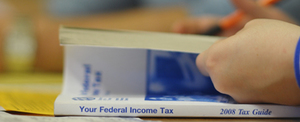Students help at tax time
Published: April 18, 2013 / Author: Scott Frano

Filing your income taxes can be a scary thing, with a tax code full of small details and the fear of an audit. Thankfully for low-income residents of South Bend and international students at Notre Dame, more than 100 students at the Mendoza College of Business offer their tax help yearly at no charge.
The Vivian Harrington Gray Notre Dame/Saint Mary’s Tax Assistance Program (TAP) was founded in 1972, by Prof. Ken Milani and a handful of students. For the past 41 years, TAP has prepared tax returns for low-income and disabled taxpayers in the South Bend area. TAP also prepares returns for Notre Dame’s international students, who have complicated filing procedures.
Milani is still involved with the program, but has ceded much of the responsibility to Prof. Edward Hums, also of Mendoza. Hums teaches financial and managerial accounting and, in 2008, received the Edmund P. Joyce, C.S.C., Award for Excellence in Undergraduate Teaching. Professors Janet O’Tousa of Notre Dame and John Cergnul of Saint Mary’s are also major contributors to the program.
Senior Samantha Matthew ’13 is TAP’s student president. She heard about the program through Hums sophomore year, and based part of her junior year schedule on the program.
“I thought it sounded like a great opportunity,” she said.
Hums said international students are informed of the program by the International Student Office, but in order to reach the South Bend community, TAP must advertise to them.
“We publish a website and we try to get articles in the local paper,” Hums said. “Word-of-mouth is always big. We partner with the St. Joseph County Public Library, and we have four sites there. We have one at the Mishawaka Public Library, and when we’re at those sites, the word does get around. There are a lot of people that go to the library and see the announcement. We have a lot of people that come back each year to the same site to get their taxes done.”
While the benefit to South Bend residents is clear, Matthew said students in the program find the experience rewarding professionally. She will be working for PricewaterhouseCoopers’ Auditing Department next year in Detroit.
“The firsthand experience is something you can’t get in a classroom,” she said. “I’ve probably learned more in the field than I have in just about any class, even though it’s just six to eight weeks a semester. You learn how to act professionally in front of the taxpayers and how to conduct yourself. The whole experience is really beneficial.”
A total of 98 undergraduates are participating in the program this year, along with a few graduate students. They expect to handle about 3,900 returns this year, with the undergraduates handling domestic returns and the graduate students handling the international returns.
Most returns are not problematic. But Hums said his students do run into the typical issues that accountants must deal with.
“People have preconceptions of what is and is not taxable,” Hums said. “There are instances where Social Security is taxable. We have a lot of folks who get unemployment compensation and that is taxable, not the whole thing, but certain parts. They may not be expecting that, and sometimes it’s tough to tell them. The next biggest thing is that sometimes people do not have all the documents. We don’t guess. They have to have the document.”
The IRS inspects each tax return done by TAP and also the program itself. This year, the IRS audited four TAP sites in South Bend (each passed easily). Student participants must take IRS-sponsored classes and pass IRS-sponsored exams.
Most of TAP’s sites are located in the city. Hums said some South Bend residents are afraid to come to campus, for similar reasons to why they might fear the IRS.
“We have to be close to campus, but away from it,” Hums said. “You find out over years doing this that there are very many people in this area that are intimidated by coming onto campus at Notre Dame. It’s a scary, big place, and people are intimidated by the size. Ken always thought it was better to go out into the neighborhoods, to provide a better level of service and reach more people.”
South Bend’s Hispanic community is one area Hums feels TAP can expand into, but that depends on the number of volunteers available.
“We’re looking at doing an outreach into the Hispanic community into South Bend,” he said. “We’ve never really gone into that neighborhood, but I think there is a growing need there and we would like to get into.”
TAP also benefits from a number of program alumni that return each year.
“We have CPAs and accountants that volunteer and come in. We have alumni that come in from Chicago,” he said. “They just come in to be around the program, where they had such a great experience, and do an afternoon of service.”
Though TAP has helped her prepare for her career, Matthew enjoys the personal side of it.
“My favorite part is just interacting with the people in the community, honestly,” she said. “Sometimes with that you learn so much about them that the connection you make is really invaluable. Along with that, they appreciate the help so much. It just makes you appreciate your education and everything that you’re getting here so much more.”
Note: This article originally was published on ND Today, the e-newsletter of the Notre Dame Alumni Association.
/news_and_events/news_articles/article/12830/students-help-at-tax-time




